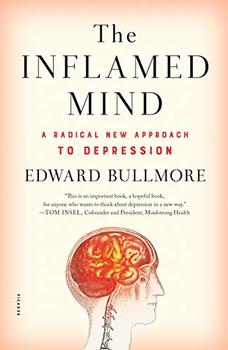Summary | Excerpt | Reviews | Beyond the Book | Readalikes | Genres & Themes | Author Bio

A Radical New Approach to Depression
by Edward BullmoreOne
DARING TO THINK DIFFERENTLY
We all know depression. It touches every family on the planet. Yet we understand surprisingly little about it.
This dawned on me in an acutely embarrassing way one day in my first few years of training as a psychiatrist, when I was interviewing a man in the outpatient clinic at the Maudsley Hospital in London. In response to my textbook-drilled questioning, he told me that his mood was low, he wasn’t finding any pleasure in life, he was waking up in the small hours and unable to get back to sleep, he wasn’t eating well and had lost a bit of weight, he was guilty about the past and pessimistic about the future. “I think you’re depressed,” I told him. “I already know that,” the patient told me, patiently. “That’s why I asked my GP to refer me to this clinic. What I want to know is why am I depressed and what can you do about it?”
I tried to explain about anti-depressant drugs, like selective serotonin reuptake inhibitors, or SSRIs, and how they worked. I found myself burbling about serotonin and the idea that depression was caused by a lack of it. Imbalance was the word I had heard more experienced psychiatrists deploy with aplomb on these occasions. “Your symptoms are probably caused by an imbalance of serotonin in your brain and the SSRIs will restore the balance to normal,” I said, waving my hands around to show how an imbalanced thing could be rebalanced, how his wonky mood would be restored to equilibrium. “How do you know that?” he asked. I started to repeat all the stuff I had just learnt from the textbooks about the serotonin theory of depression, before he interrupted: “No, I mean how do you know that about me? How do you know that the level of serotonin is imbalanced in my brain?” The truth is that I didn’t.
That was about 25 years ago, and we still don’t have confident or consistent answers to these and many other questions about where depression comes from or what to do about it. Is depression all in the mind? Is my depression “just” the way I am thinking about things? But then why is it so often treated with drugs that work on nerve cells? Is it “really” all in the brain? To our friends and family who are depressed, we may not know what to say. If we are depressed ourselves, we may feel ashamed to say so.
The silence around depression and other mental health disorders is less deafening now than it was. We are getting better at talking about it, which is good, even if we don’t always agree with each other. We can see that depression is very common, it can be really disabling in many ways and it can reduce both the quality of life – depressed people have less experience of pleasure – and the quantity of life – depressed people have reduced life expectancy. We’re not surprised to read that the economic costs of depression and related disorders are so vast that if we could completely cure depression in the UK from the start of the next financial year it would be roughly equivalent to adding 4% to GDP, or tripling the projected annual growth rate of the whole economy from 2% to 6%. If the country somehow became totally un-depressed, we’d boost our national wealth massively.
But despite our growing awareness of how commonly depressive episodes and disorders crop up among people we know, and the massive scale of the public health challenge that depression represents globally, we still have only limited ways of dealing with it. There are some widely available and moderately effective treatments out there; but there have been no breakthrough advances in the last 30 years. What we had for depression in 1990 – serotonin-tweaking drugs, like Prozac, and psychotherapy – is pretty much still all that we’ve got therapeutically. And that’s evidently not good enough: otherwise depression wouldn’t be on track to become the biggest single cause of disability in the world by 2030.
Excerpted from The Inflamed Mind by Edward Bullmore. Copyright © 2018 by Edward Bullmore. Excerpted by permission of Picador. All rights reserved. No part of this excerpt may be reproduced or reprinted without permission in writing from the publisher.
Your guide toexceptional books
BookBrowse seeks out and recommends the best in contemporary fiction and nonfiction—books that not only engage and entertain but also deepen our understanding of ourselves and the world around us.